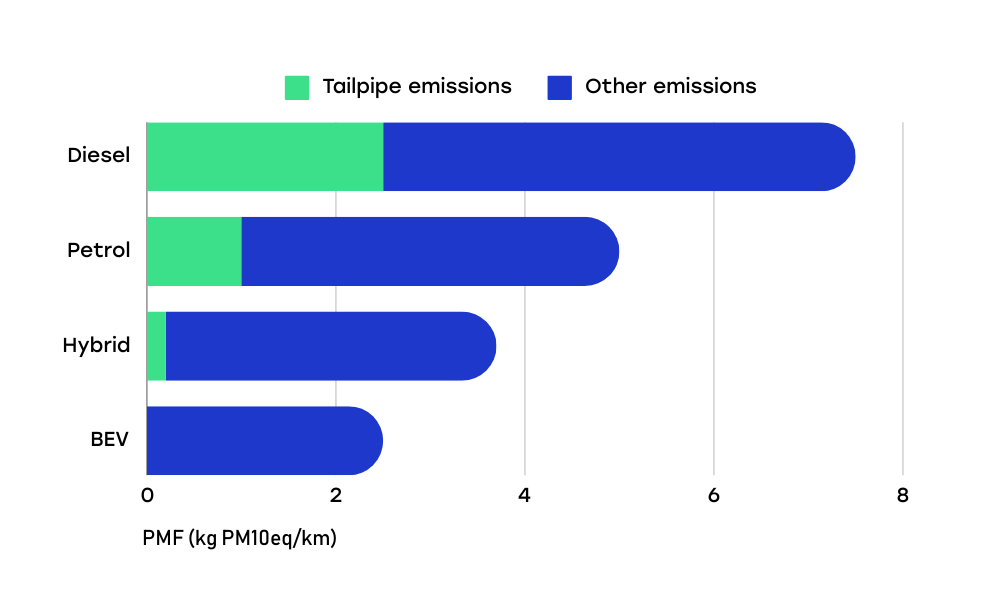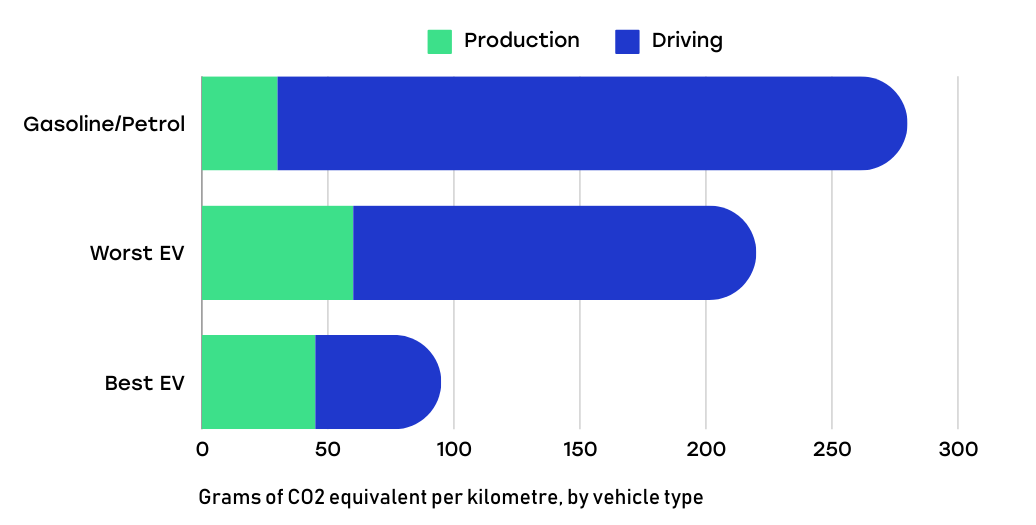The debate on the environmental impact of electric cars is in full swing. Many studies claim they are cleaner than traditional petrol cars, while others highlight the high emissions during production. But what is the truth? Are electric vehicles really better for the environment?
Reduced greenhouse gas emissions
It is true that electric cars emit more during production. But this difference is made up by the fact that they have no emissions during their entire lifetime. This is not the case with traditional vehicles such as petrol or diesel cars. These emit not only CO₂ during production, but also kilos while driving.
Multiple studies confirm this. They show that the amount of CO₂ released in the production of an electric car does not outweigh the CO₂ emissions of a petrol engine over its lifetime. Unlike petrol cars that emit greenhouse gases while driving, electric vehicles do not produce direct exhaust emissions. This significantly reduces emissions, helping to combat the greenhouse effect and global warming.
Also less particulate matter in the air
One of the biggest advantages of electric driving is the significant reduction in air pollution. Traditional cars emit pollutants such as nitrogen oxides, sulphur oxides and fine particles into the air, which can have harmful effects on human health and the environment. EVs, on the other hand, do not produce exhaust fumes, which means there are fewer pollutants in the air. This leads to better air quality and a healthier living environment for everyone.

Source: Vlaanderen.be (figures are illustrative) BEV= battery electric vehicle
Less dependence on fossil fuels
The production of electricity for charging electric cars can also become more sustainable as we invest more in renewable energy sources such as solar and wind. Belgians are on the fifth place worldwide of the most solar panels per capita. We can use these solar panels to generate energy to charge electric cars. This means electric driving will have an even lower carbon footprint in the long run.
Electric cars thus help reduce our dependence on fossil fuels. Petrol cars rely on petrol, which is extracted from fossil fuels such as oil. The extraction, refining and transportation of fossil fuels contribute to environmental degradation and air pollution. And these energy sources are exhaustible, meaning they will run out one day and are no longer usable. Electric cars, on the other hand, can be powered by electricity generated from renewable energy sources. By choosing electric cars, we can reduce our dependence on finite fossil fuels and move towards a more sustainable energy future.
Electric car lifetime emissions

Multiple studies over the years show that over their entire lifetime, from production to disposal, electric vehicles have a smaller carbon footprint than petrol cars. This is due to the more efficient operation of electric motors, the use of renewable energy for charging and the ability to recycle EV batteries.
Battery production for electric cars does require energy and raw materials, which has an impact on the environment. However, manufacturing technologies are constantly being improved and the impact of battery production is reduced by using renewable energy sources. Moreover, EV batteries can be reused in energy systems at the end of their life or recycled to extract valuable materials
And yes, electric cars do get recycled. There is even a dedicated Febelauto plant in Belgium for this purpose. Here 97,1% of old cars are recycled and given a new life, including electric cars.
The production of an EV battery
The production of lithium-ion batteries, which are most commonly used in EVs, requires the mining of raw materials such as lithium, cobalt and nickel. These mining activities have environmental impacts, including carbon emissions and water consumption. A study by the IVL Swedish Environmental Research Institute from 2019 estimates that the production of a 100-kWh lithium-ion battery emits about 61-106 kg equivalent per kWh . This means that the production of this battery emits between 6100 and 10,600 kg of CO₂.
However, the production of traditional internal combustion engine (ICE) vehicles also releases a significant amount of CO₂. A study published in the journal Nature Sustainability in 2020 states that the production of an average petrol or diesel car emits about 6000-8000 kg of CO₂ equivalent. In the case of an EV, this figure depends very much on how the car is produced. If renewable energy sources are used during production, this figure is much lower. To produce a Tesla Model 3 battery CO2 emissions are between 3,000 and 15,000 kg.
Renewable energy and technological advances
Moreover, great strides have been made towards cleaner production processes for EV batteries. Many manufacturers, such as Tesla and Volkswagen, are investing in green energy and more efficient production methods to minimise environmental impact. Tesla's Gigafactory in Nevada, for example, runs largely on renewable energy sources.
An Australian start-up Vulcan deals with green lithium mines, using geothermal energy to power lithium mining. Geothermal energy is geothermal energy, and thus energy created by a temperature difference between the earth's surface and the heat deep in the earth. So this is a completely natural way of generating energy.
Electric cars have highest eco-score
To evaluate the ecological impact of cars, the Flemish government uses the 'eco-score'. This score indicates how environmentally friendly a vehicle is: the higher the score, the less harmful the vehicle is for the environment. Electric cars, for example, score particularly well with an eco-score of 88, while diesel cars score considerably lower with a score of 69. This difference highlights how much more environmentally friendly electric vehicles are.
You can check your car's score yourself on the website: https://ecoscore.be/
Second-hand car market
Electric cars can last up to 20 years, meaning there is a great opportunity for a good second-hand market. Buying a used electric car is an affordable way to switch to electric driving. It also reduces the impact on the environment by spreading the emissions from production over a longer time and multiple owners.
In Belgium, the used electric car market is growing rapidly. The number of second-hand electric cars has increased significantly in recent years. In the first half of this year, there were 87,3 procent more used electric cars sold than in the same period in 2023. This is partly due to the rapid adoption of electric cars and government support such as subsidies and tax breaks for both new and used EVs.
In Belgium, websites like 2dehands.be and Autoscout24.be are popular for buying and selling used electric cars. You can find models such as the Nissan Leaf, BMW i3 and Tesla Model S, making it more attractive to make the switch to electric driving without the high cost of a new car.
Government incentives
Recognising the importance of electric cars in the fight against climate change, the Belgian government has introduced several measures to encourage EV adoption. These incentives make it more attractive for consumers and businesses to switch to electric driving.
Subsidies and premiums
Belgium offers significant subsidies for the purchase of electric vehicles. In Flanders, individuals can apply for a premium for the purchase of an all-electric car. This premium can reach up to €4,000, depending on the purchase price of the vehicle.
Tax benefits
Besides direct subsidies, the Belgian government also offers various tax breaks for electric vehicle owners:
Reduced Immobilisation Tax (GST): Electric vehicles are in many cases subject to a reduced rate or even a full exemption from the V.A.T., resulting in significant savings when registering a new car.
Lower vehicle tax: Lower vehicle tax: EVs benefit from a lower annual road tax compared to petrol and diesel cars. This tax benefit remains in place throughout the life of the vehicle, reducing the total cost of ownership of an electric car.
Benefits for companies
Companies are also encouraged to green their fleets with the help of various incentives:
Tax-deductible: Electric commercial vehicles are 100% tax deductible, meaning that the costs of purchasing and using electric vehicles can be fully deducted from taxes. This also applies to the installation of charging points at businesses.
Electric cars offer a cleaner, more sustainable and attractive mode of transport. With the ongoing development of battery technologies and the expansion of charging infrastructure, electric cars will become increasingly affordable and practical.
Switching to electric driving is an investment in our planet and our future.